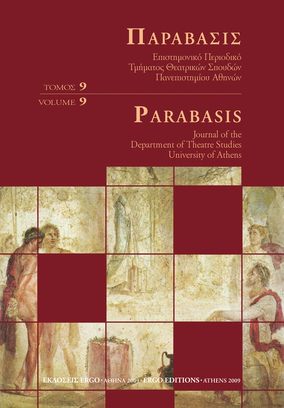Παυσίλυπα θεάματα : το θέατρο και ο κινηματογράφος στα χρόνια της οικονομικής κρίσης (1929-1931) : η κρατική παρέμβαση
Part of : Παράβασις : επιστημονικό περιοδικό Τμήματος Θεατρικών Σπουδών Πανεπιστημίου Αθηνών ; Vol.8, No.1, 2008, pages 433-438
Issue:
Pages:
433-438
Parallel Title:
Theatre and cinema during the crisis years (1929-1931) : the role of the state
Section Title:
Μελέτες και άρθρα
Author:
Abstract:
In the Interwar period theatre felt a strong threat by the tremendous expand of the new art of cinema. Things became worse after the crisis of 1929; lack of money made a lot of people prefer going to the cinema, as it was cheaper. Things were different in Greece of the 1930’s; new theatres were built and older ones were rebuilt or renovated. Finally, open-air cinemas often invited touring theatre groups to play in small scenes set in front of the cinema screen. During these years imports were prohibited in Greece, but for some curious reason foreign films were still coming in. Film import cost a lot the Greek economy. The financial loss could be reduced only by the local theatre production, capable to compete successfully with the foreign films. Unfortunately, the government didn’t realize it and consequently didn’t try to support the Greek theatre production. The main reason was this; the most popular theatre of the period was Revue, a genre connected by definition with political criticism. Therefore, governments from 1931 to 1936 preferred to impose strict censorship upon the light musical theatre. Unlike his predecessors, the dictator Ioannis Metaxas (1936-1941) forced the Revue to become part of his propaganda mechanism. Revue was thus silenced and this made light musical theatre fans abandon it and turn to cinema. They had decided that only the latter could offer them what they really wanted, two hours of pure entertainment.
Subject (LC):




